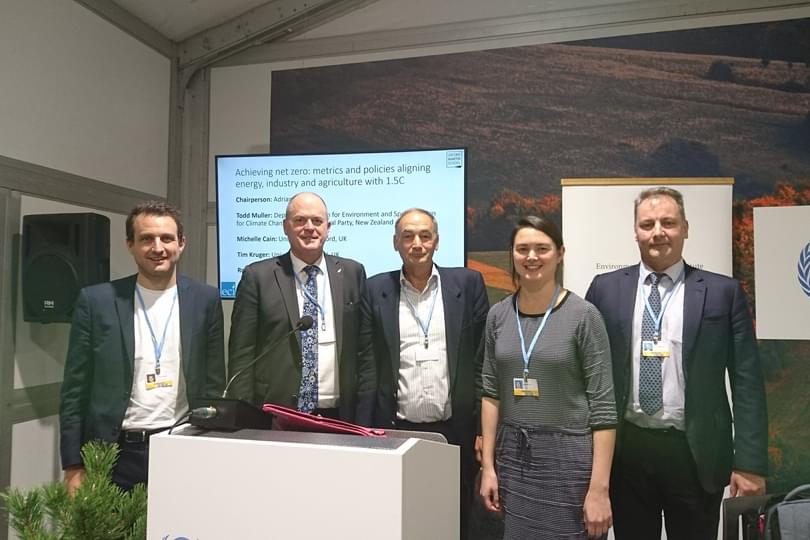
Oxford Martin School experts took to the stage at COP24 last week, hosting a side event during the conference in Katowice, Poland, to address key issues around greenhouse gas metrics and set out what ‘net zero’ emissions will mean for energy, industry and agriculture.
After the recent IPCC special report on limiting global warming to 1.5°C, the science is clear that every additional half degree of warming will have significant and adverse effects on the planet and on human life. And to keep warming within the ‘well below 2°C’ commitment of the Paris Agreement the world needs to achieve ‘net zero’ by mid-century. However, there is still much debate over what ‘net zero’ means, what policy development will be required and how it will be measured.
At the event, Dr Michelle Cain presented the scientific reality that the accumulation of carbon dioxide in the atmosphere over time means zero carbon dioxide emissions must be reached to stop global warming. Other anthropogenic climate factors like methane and aerosols also contribute to warming, but because of their short half-life they do not accumulate, so reducing these emissions but not eliminating them is still compatible with a 1.5°C future.
This has implications for economies with a significant agricultural component either from ruminant livestock farming or rice cultivation, both major contributors to methane emissions, she argues. If standard metrics are used to define ‘net zero emissions’, this would not lead to ‘net zero warming’, as these methods do not directly link short-lived pollutants like methane to the warming they cause. Long-lived and short-lived pollutants have to be treated separately if the climate impact is to be correctly assessed. “Correctly identifying the warming impact of policy measures will allow for their fair evaluation, and avoid unintended perverse outcomes, for example, short-term cooling followed by long-term warming”, says Dr Cain.
New Zealand was held up as an example of an economy where a large proportion of total emissions are from agriculture, where the impact of methane emissions is widely misunderstood because of the ubiquity of inappropriate metrics. Event chair, Dr Adrian Macey of Victoria University of Wellington, and Chair of the recently formed New Zealand Climate Forum and Todd Muller, Deputy Chairperson for Environment and Spokesperson for Climate Change for the National Party, New Zealand, discussed the progress that New Zealand was making on this front.
Tim Kruger of the Oxford Geoengineering Programme also presented on how the deployment of proposed Greenhouse Gas Removal (GGR) techniques could support ‘net zero warming’. Discussing balancing proposed techniques with potential societal harms and how policy instruments could facilitate and incentivise the drawing down of carbon from the atmosphere, he sought to articulate how GGR could bridge the gap between current decarbonisation rates and a 1.5°C future.
- The video of the event can be viewed online here (click 'Join the event')
- A brief outline of Tim Kruger and Dr Michelle Cain’s presentations can be found here